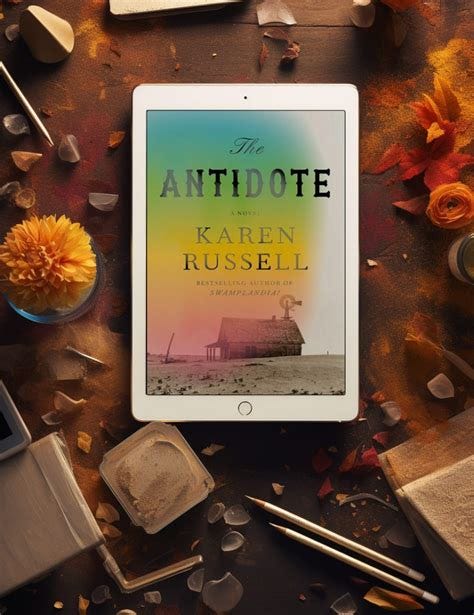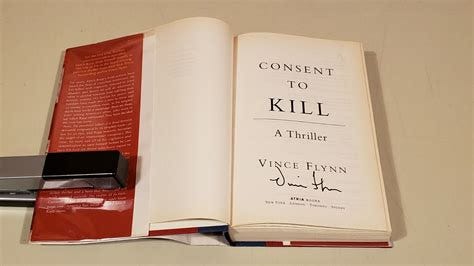April 2025 Book Club Pick
Two books: The Antidote by Karen Russell & Consent To Kill by Vince Flynn
The Antidote by Karen Russell
Karen Russell’s "The Antidote" is a richly imaginative and deeply layered novel set in the fictional town of Uz, Nebraska, during the Dust Bowl era in 1935. The story begins with the infamous Black Sunday dust storm, which devastated farms and livelihoods across the Great Plains. Uz, a small, isolated community, becomes the stage for an intricate narrative blending historical fiction with magical realism.
At the center of the novel is the "Prairie Witch," also known as the Antidote, a mysterious figure who serves as a living vault for the town’s secrets and memories. Through an emerald-green earhorn, she absorbs the burdens of others, allowing them to forget their pain or shame. However, this process leaves her physically and emotionally weighed down by the memories she houses. Following Black Sunday, she loses her ability to retain these deposits, creating chaos among her clients and leaving her hollowed out.
The novel’s ensemble cast includes:
Harp Oletsky, a Polish-American wheat farmer whose land is mysteriously spared from the dust storm’s destruction.
Asphodel (Dell) Oletsky, Harp’s orphaned teenage niece and a determined basketball player grappling with her mother’s unsolved murder.
Cleo Allfrey, a Black photographer working under Roosevelt’s New Deal Resettlement Administration, whose camera captures unsettling glimpses of Uz’s hidden past and possible futures.
A sentient scarecrow, animated by memories and secrets, adding a surreal dimension to the story.
Russell intertwines these characters’ lives with themes of grief, memory, environmental devastation, and historical reckoning. The novel also explores broader issues such as Native American displacement, racial injustice, and societal trauma tied to resettlement and environmental collapse.
Stylistically, Russell employs vivid prose and sharp imagery to evoke both the physical desolation of the Dust Bowl and the emotional landscapes of her characters. The fantastical elements—such as the witch’s memory vault and Cleo’s prophetic camera—serve as metaphors for collective trauma and historical erasure. The town of Uz itself is symbolic, drawing parallels to both biblical Job’s trials and L. Frank Baum’s Oz as a place of despair yet latent possibility.
Although praised for its ambition and originality, some critiques note that certain subplots—such as Cleo Allfrey’s story line—feel underdeveloped compared to others. Additionally, the novel's pacing slows toward its climax due to lengthy speeches by Harp Oletsky that tie into Russell's historical commentary.
Overall, "The Antidote" is an ambitious work that combines historical realism with speculative elements to examine how communities confront—or evade—their painful pasts. It is both a haunting reflection on human resilience and an urgent call to acknowledge history's truths in shaping our collective future.
Consent to Kill by Vince Flynn
"Consent to Kill" by Vince Flynn is the eighth installment in the Mitch Rapp series, a gripping political thriller that delves into themes of vengeance, betrayal, and survival. The novel follows CIA operative Mitch Rapp, a seasoned counterterrorism agent, as he becomes the target of an international assassination plot orchestrated by powerful enemies.
The story begins with Saeed Ahmed Abdullah, a billionaire Saudi jihadist, seeking revenge after believing Rapp killed his son during a covert operation. Saeed places a $20 million bounty on Rapp's head and enlists the help of Saudi Prince Muhammed bin Rashid, who connects him with Erich Abel, a former East German Stasi officer. Abel hires a husband-and-wife assassin duo, Louis Gould and Claudia Morrell, to execute the hit. Despite Claudia's moral objections to collateral damage, the couple accepts the mission and travels to America.
As Rapp becomes aware of the plot against him, he faces relentless attacks from various factions. A Latino gang hired by Saudi intelligence storms his safe house in an intense firefight that showcases Rapp's tactical brilliance and resilience. Surviving the assault, Rapp methodically tracks down those responsible for orchestrating the attacks. His pursuit takes him from Washington, D.C., to Afghanistan and beyond, as he uncovers a web of betrayal involving high-ranking officials and foreign operatives.
The novel's tension escalates when Rapp's personal life is targeted. His wife, Anna, becomes collateral damage in the vendetta against him. Devastated and enraged, Rapp seeks retribution with unrelenting determination. The climax sees him exacting justice in a dramatic confrontation that involves deception and explosive action.
Flynn masterfully weaves political intrigue with high-stakes action, creating a fast-paced narrative that explores the complexities of global terrorism and espionage. The characters are richly developed, with Mitch Rapp embodying both the heroism and moral ambiguity of a counter-terrorism operative willing to take extreme measures for justice. Supporting characters like Irene Kennedy, the CIA Director, add depth to the story line by showcasing the challenges of leadership in a morally gray world.
"Consent to Kill" is not only an action-packed thriller but also a poignant exploration of loss and revenge. Flynn's meticulous attention to detail in depicting covert operations and geopolitical dynamics makes this novel a standout in the genre. It appeals to fans of political thrillers who appreciate complex plots and morally conflicted protagonists.






